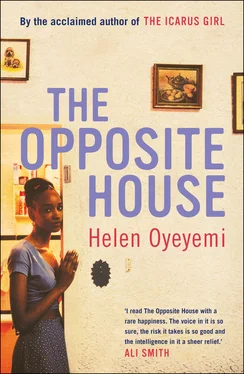Helen Oyeyemi - The Opposite House
Здесь есть возможность читать онлайн «Helen Oyeyemi - The Opposite House» весь текст электронной книги совершенно бесплатно (целиком полную версию без сокращений). В некоторых случаях можно слушать аудио, скачать через торрент в формате fb2 и присутствует краткое содержание. Год выпуска: 2008, Издательство: Bloomsbury UK, Жанр: Современная проза, на английском языке. Описание произведения, (предисловие) а так же отзывы посетителей доступны на портале библиотеки ЛибКат.
- Название:The Opposite House
- Автор:
- Издательство:Bloomsbury UK
- Жанр:
- Год:2008
- ISBN:нет данных
- Рейтинг книги:4 / 5. Голосов: 1
-
Избранное:Добавить в избранное
- Отзывы:
-
Ваша оценка:
- 80
- 1
- 2
- 3
- 4
- 5
The Opposite House: краткое содержание, описание и аннотация
Предлагаем к чтению аннотацию, описание, краткое содержание или предисловие (зависит от того, что написал сам автор книги «The Opposite House»). Если вы не нашли необходимую информацию о книге — напишите в комментариях, мы постараемся отыскать её.
The Opposite House — читать онлайн бесплатно полную книгу (весь текст) целиком
Ниже представлен текст книги, разбитый по страницам. Система сохранения места последней прочитанной страницы, позволяет с удобством читать онлайн бесплатно книгу «The Opposite House», без необходимости каждый раз заново искать на чём Вы остановились. Поставьте закладку, и сможете в любой момент перейти на страницу, на которой закончили чтение.
Интервал:
Закладка:
What Papi did say about having to leave the country was something that Señora Roberts wouldn’t have found exciting. He said that the process that ends with you fearing for your life is gradual and actually quite congenial. It begins in a warm daze as the sun lays you bare in corner-room meetings. Paper falls apart under your sweaty fingers as you read and re-read directives and statements that you know it is essential for you to understand. If you don’t teach certain things, or if you forget to praise certain people and initiatives, you are called to account and at first you think that you are defective — then you realise that you’re becoming unreasonable because no one else is being reasonable.
Papi says, ‘If not reason, then what else can it be that separates us from animals, what is it that makes us fail to be innocent before God?’
I said, ‘I suppose by God, you mean reason undiluted.’
Papi ignored me and said, ‘There is something else. Unless the nature programmes are hiding something interesting from us, you never see a wolf struggling in a trap while a full pack of its own stand around it in a formal square, waiting for it to escape or to die. I don’t know what to call it, this other thing that makes us different from the wolves.’
‘Papi, I think that’s called malice.’
‘But that’s not what it is. It’s functional, it’s a process, it’s what must happen to ensure that a group remains a group. It’s what happens when something inside you cancels out your outer appearance and you show yourself not to belong. That’s what makes us different from the wolves; a body may appear as one of us and not be treated as one of us. Three categories of treatment instead of one. Person, God, and beast. And no term for what’s at the heart of it. Well, German’s the language of ideas. I’ll ask Chabella,’ Papi said, and I knew that he wouldn’t.
When Papi looks at Tomás trying to fight his reflux, I can see how darkly simple his pain is. My brother did not get his co-ordination from Papi. Papi was a bad dish washer and bad at keeping stacked crockery close to his body — he would forget his limits, place his hands higher and let the bottom of the stack go to pieces on the floor. Or if it was cutlery he had to wash them all over again. He didn’t think of money as money; he thought of it as a way to get books, going over title lists in his head over and over again, returning to the places where he felt strongest. Cuba was the restaurant kitchens and the narrow, high platform on which he moved. Whenever he cut his knuckles on knives and potato peelers hidden in the dishwater, the pain always came very late.
For a long time my Papi did not realise that hunger was the reason why he had to keep touching things to stop them floating away from him. When Chabella first met my Papi his eyes were still too big; prolonged malnutrition is hard to shake off.
History books: Papi stubbornly scratched surfaces to look for Africa. He knew that his friends hid dismay behind their teasing, that they wondered where the black boy was in him, the snap-back, the physical intelligence. But he had the snap-back; it was in his head.
When my Papi was Tomás’s age he would not listen to the restaurant owners’ comments that began: ‘The good thing about you morenos is that you can work! God, but can you work. . on and on.’ He didn’t listen, but because he didn’t sneer, people didn’t know what he was thinking.
Papi saw a babalawo cry. Papi saw a babalawo come out into the street and stretch himself out on the ground because his daughter had died. He had come to heal her because under Batista no one poor could get taken care of unless they knew someone in authority. But that babalawo could do nothing against his daughter’s cancer, the cells that unsheathed crab claws and waged civil war on each other. The babalawo was dressed in civilian clothes but Papi recognised him; he had come from La Regla. Papi’s uncle worked the docks there, and Papi’s cousins had been blessed and made Santeros by this very babalawo . Papi told me that this babalawo was over six feet tall and white-haired, that he was very, very black. ‘Can you imagine?’ Papi mused.
I could not.
‘The other boys from the neighbourhood were playing some bastardisation of baseball, but they steered clear of this priest. They took their game down to the other end of the street. They said, “Juan, come in on Miguel’s team,” but like the bookhead I was, I was on my way to the library and I didn’t want to tell them. But to get to the library I had to pass that priest. He lay very still; he was like a stain on the ground. So black. After only a second of looking at him he became something very simple to me, something just hurting on the ground, something with no other thoughts. I think I could have stamped on him and he would not have understood what I had done.
‘I got worried that some of those Americanos would come with cameras and take a picture. I was thinking, Get up, you. Just get up, get up . Blood was pouring from his mouth; every time he opened it his lips made this wet slapping noise and flies came near. I bent down to him, but I couldn’t do anything. I saw his tongue. Well, half his tongue. He had bitten his tongue in half; the end of it was in the dust, sort of coiled up like a wet tail. The heat made it smell. And he was just trying to speak, trying to speak to the sky I think, not to me, but his mouth was full of blood.’
Tomás doesn’t believe Papi about the babalawo . ‘You didn’t see his tongue, man. Not his tongue. Maybe you heard about that. He probably just drank chicken blood as part of a ritual or something.’
Papi is adamant: ‘It was his tongue. His daughter died and he bit it off. I ran away from him. You shouldn’t run away from grief, but my God, you must run from madness. That country. It seems that no one there is able.’
What if Papi has no strength either? What if he is wrong not to live in the place allocated to him and he is gusano? Then Tomás is the son of a gusano , and, after all, worms eat soil and dead bodies. If the boy can’t keep food down, maybe food is not meant for him. What can it mean, not to be in love with your country? That you belong above the earth, or under it.
One evening dinner was haphazard; moros y cristianos with yuccas rellenas and ladlefuls of stew poured over. Amy Eleni ate with us, and every bite brought her a surprise — one minute she tasted mashed rice and beans, the next mashed potato and beef, the next spicy tomato.
I teased Chabella about the Moors and Christians — ‘The beans are black, right, so that’s the Moors, and the rice is white, so those are the Christians. . ay , Mami, we can’t be Christians, we’re black!’ Amy Eleni backed me up; she said she reckoned that she was a Moor, and she wanted to know what Chabella was going to do about that. Mami whooped, ‘I didn’t name the dish!’
Papi didn’t say much. He ate and darted his attention from his own plate to Tomás’s face. And, maybe because of the pressure of Amy Eleni’s presence, Tomás gave a small cough, the beginnings of a full-blown heave. Mami still smiled, but she quieted down, became watchful. Amy Eleni knew something was wrong and she looked at Tomás, too, even though I fussed at her to distract her, poured her more water, poured her more juice. Tomás bowed his head and pressed his hands on his knees, arguing with his food, his cheeks distended. Papi twitched but kept on eating, even when Mami gave him a quick, deep, mournful glance.
When Tomás looked at him, Papi barked, ‘Téngalo en. Tragalo hacia abajo.’ He told Tomás in Spanish to hold it in, to swallow it down, because he didn’t want Amy Eleni to know what he was saying. But Tomás wouldn’t hear him. He just held on to the chair and lowered his head, waiting for Papi to let him go to the bathroom.
Читать дальшеИнтервал:
Закладка:
Похожие книги на «The Opposite House»
Представляем Вашему вниманию похожие книги на «The Opposite House» списком для выбора. Мы отобрали схожую по названию и смыслу литературу в надежде предоставить читателям больше вариантов отыскать новые, интересные, ещё непрочитанные произведения.
Обсуждение, отзывы о книге «The Opposite House» и просто собственные мнения читателей. Оставьте ваши комментарии, напишите, что Вы думаете о произведении, его смысле или главных героях. Укажите что конкретно понравилось, а что нет, и почему Вы так считаете.












